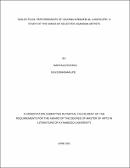| dc.description.abstract | This study explores the dialectical performance of Uganda’s political landscape in songs of
selected artists. It examines the songs produced between 2011-2018 a period when Uganda is
under the leadership of the National resistance movement (NRM) government. The study is
guided by three objectives; the themes embedded in the songs critical of government and those
in praise of government, the figurative language employed in the songs and the performance of
the songs. The study is library based and employs qualitative methods of data collection and
analysis. It employs Marxist literary theory’s tenet of dialectical criticism to analyze the songs
from selected Ugandan artists and how they controversially portray Uganda’s political
landscape. The findings of the study show that the themes of songs critical of government include
corruption, social injustice, erosion of rule of law and the need for civic engagement, while the
themes in songs in praise of government are provision of security, provision of adequate
Education and health care, women empowerment and economic stability. The study also
examines the figurative language used in the songs such as metaphors, symbolism, irony,
repetition, refrain and the use of opening statements. The study asserts that artist critical of
government use figurative language more emphatically than artist in praise of government. The
purpose is to defarmiliarise the ills of the regime so that the audience’s perception about them is
renewed. The study also analyses the performance of songs. It focuses on elements such as
costume, histrionics and dramatization. The study asserts that songs critical of government have
more aesthetic success in employing the elements of performance than the songs in praise of
government. The purpose is to enhance their messages and clearly portray the ills of the
government. | en_US |

